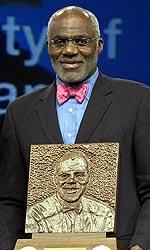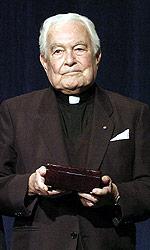Rev. Theodore M. Hesburgh, C.S.C., And Former Irish Football All-American Alan Page Receive NCAA’s Two Highest Awards
Two honored at the 2004 NCAA Convention.
Jan. 11, 2004
NOTRE DAME, Ind. – The University of Notre Dame’s president emeritus, the Rev. Theodore M. Hesburgh, C.S.C., and former Notre Dame football All-American Alan Page, now a Minnesota Supreme Court judge, received the NCAA’s two highest awards Jan. 11 at the 2004 NCAA Convention in Nashville, Tenn.
Father Hesburgh became the first recipient of the NCAA’s President Gerald R. Ford Award. The award, named in recognition of former President Gerald Ford, honors an individual who has provided significant leadership as an advocate for intercollegiate athletics on a continuous basis over the course of his or her career. NCAA president Myles Brand presented the award to Rev. Hesburgh at the opening business session of the ’04 NCAA Convention at the Gaylord Opryland Resort and Convention Center in Nashville.
Former President Ford was unable to attend the ceremony because of medical travel restrictions. Ford’s son, Jack, attended on his father’s behalf.
Hesburgh spoke of President Ford’s fairness.
“President Ford started out by doing something controversial, forgiving President (Richard) Nixon for his faults. But that didn’t seem all that unusual to me — after all, I had spent more than half my life forgiving people,” Hesburgh stated.
Also, Hesburgh commended not only the NCAA, but student-athletes for striving to be better students, as well as athletes.
“I’m proud of the NCAA, of which I’ve been critical at times, but which I now see as becoming even better than I had imagined,” Hesburgh said. “I am most grateful for this award.”
Page was recognized that same night for his successes and many contributions to intercollegiate athletics and higher education when he became the 37th recipient of the Theodore Roosevelt Award during the NCAA Honors Dinner. The coveted “Teddy,” named for the 26th President who played a key role in founding the NCAA, is presented annually to a distinguished citizen of national reputation and outstanding accomplishment. Former winners of the award include four former presidents — Ronald Reagan, George H. W. Bush, Gerald Ford and Dwight Eisenhower. Last year’s winner was former Olympian Donna de Varona.
“It wasn’t that long ago that I served on the Honors Committee, though I must confess that it never occurred to me then, or 12 years ago when I received the Silver Anniversary Award, that I would one day have my name included in this community of outstanding individuals who have received the Teddy Award,” Page said upon acceptance of the award. “Indeed I’m still not sure that I qualify, but I will accept.”

Former Irish football All-American Alan Page was the 37th recipient of the Theodore Roosevelt Award. |
|
Page stressed the importance of being a positive role model for children, emphasizing that character is not about scoring goals or making touchdowns, but about what people do off the field. It’s about taking responsibility, he said, and using influence in a positive way.
“I believe that children are the future and that the future is mostly about hope,” he said. “If we are to make the future better and brighter, then we must educate our children, for they will be tomorrow’s leaders. I know that the problems we face, whether we’re talking about equity, character or education, can seem overwhelming and out of control. I believe there are solutions to these problems and that we can get them under control.
“You don’t have to be a Supreme Court justice, or even a football hero, to make change happen. Everyone here has the ability, the opportunity and, I believe, the obligation to make the world a better place. All we have to do is act, and act we must.”
Among those representing Notre Dame in attendance were current University president Rev. Edward A. Malloy, C.S.C., athletics director Kevin White, associate vice president for University relations Charles Lennon, faculty athletics representative and law school professor Fernand “Tex” Dutile, deputy athletics director Sandy Barbour, senior associate athletics directors Missy Conboy, Bernard Muir and Jim Phillips, assistant athletics directors Mike Karwoski and Liz Muir and compliance coordinator Allen Greene.
President Ford was the 38th President of the United States. He was Vice-President when he took the oath of office in 1974 after President Richard Nixon resigned, and served as President until 1977. Ford’s political career began in 1948, when he was elected to congress from Grand Rapids, Mich. He rose to become House Minority Leader in 1965, a post that he held until appointed to the vice-presidency by President Nixon in 1973.
Ford played football at the University of Michigan where he participated on national championship teams in 1932 and 1933. He started every game at center his senior year and was voted most valuable player by teammates. Ford received contract offers from the Green Bay Packers and Detroit Lions, which he turned down in favor of studying law at Yale University. Before beginning his law courses, Ford coached freshman football and boxing. Ford continued to serve as an advocate for the value of sport his entire career, and he remains an avid golfer at the age of 90.
“Both as a public servant and as an athlete, President Ford embodies the qualities of integrity, achievement and dedication that we aspire to in intercollegiate athletics,” Brand said.
Father Hesburgh was named the president of Notre Dame in 1952 at the age of 35. He served as president until he stepped down in June 1987. Since his retirement, he has continued as a guest lecturer at the university and has written several books, including his autobiography, “God, Country, Notre Dame,” which was a national bestseller in 1990.
Father Hesburgh was presented with the Congressional Gold Medal, the highest civilian honor awarded by Congress, in July 2000. In 1964, President Lyndon Johnson awarded Father Hesburgh the Medal of Freedom, the nation’s highest civilian honor. He has held 16 Presidential appointments during his career involving a number of social issues, including civil rights, peaceful uses of atomic energy and Third World development. He has received 150 honorary degrees, the most ever awarded to one person.

Rev. Theodore M. Hesburgh, C.S.C. became the first recipient of the NCAA’s President Gerald R. Ford Award. |
|
He was educated at Notre Dame and at the Gregorian University in Rome, from which he received a bachelor of philosophy degree in 1939. In 1943, he was ordained a priest of the Congregation of Holy Cross, and in 1945, he received his doctorate from the Catholic University of America in Washington, D.C. He joined the Notre Dame Department of Religion that same year.
“Reverend Hesburgh’s 35-year career as president of one of the most prestigious universities in the country enabled him to be a major influence on the evolution of higher education in the last half of the 20th century,” said Brand. “He also is one of the strongest advocates for the contribution intercollegiate athletics can make to the academy.”
Among the contributions Father Hesburgh has made to advance the role of college sports within higher education, was his service as co-chair of the Knight Commission on Intercollegiate Athletics, which studied reform in college sports, from 1990 to 1996, and again when it reconvened in 2000.
“The first Knight Commission report – (‘Keeping Faith with the Student-Athlete: A New Model for Intercollegiate Athletics’) – was an important impetus to the academic reform movement within intercollegiate athletics that has taken place over the last dozen years,” Brand said.Each year, the NCAA president and a group of association leaders will select and present the award at the NCAA annual convention.
“The addition of this new award to the NCAA Convention serves as an enhancement to the existing elements of the convention programming and will further spotlight the positive connection between intercollegiate athletics and higher education,” Brand said.
Page was a three-year starting football defensive end and consensus All-American at Notre Dame before making the move to the NFL, where he was part of the Minnesota Vikings’ famed and feared “Purple People Eaters” defensive line.
Page led Notre Dame to Associated Press and United Press International national championships in 1966 and a 25-3-2 mark from 1964 to 1966. A first-round draft pick and 15th overall, he went on to collect 164 career sacks, block 28 punts or placekicks, recover 24 fumbles and appear in eight Pro Bowls in a professional football career that spanned 15 seasons, including 10 as a member of the Vikings and five with the Chicago Bears.
In 1971, the four-time NFC defensive player of the year became the first defensive player in NFL history to earn the league’s most valuable player award. Page was elected to the NFL Pro Football Hall of Fame in 1988 and was inducted into the National Football Foundation and College Hall of Fame in 1993.
Page has had just as big an impact in court as he did on the field. He set his sights early on a career in law, long before he developed an interest in football. Page worked his way through law school as a full-time student while maintaining his career as a professional football player. He earned his juris doctorate from the University of Minnesota Law School in 1978.
After retiring from football in 1981 and after a one-year stint as a commentator with National Public Radio, Page worked as an associate with Lindquist & Vennum before fulfilling responsibilities as a special assistant attorney general in the employment law division in Minnesota. Page served as assistant attorney general for the state from 1987 until 1993 when he was elected to the state’s supreme court.
In 1993, he earned a place in the annals of Minnesota state history by becoming the first African-American elected to sit on its Supreme Court.
A vocal proponent of education and a frequent speaker at elementary schools, Page and his wife Diane established the Page Education Foundation in 1988 to help provide educational grants to students of color to attend colleges in Minnesota. As a condition of receiving the funds, the so-called Page Scholars serve as role models and mentors for younger children with the goal of changing the future. Thus far, the foundation has awarded 3,965 grants to 1,885 students totaling more than $2.5 million.






